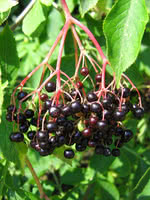Mon-Fri 9am - 5pm Mountain time
Black Elderberry vs Trader Mulberry
Sambucus canadensis
Morus x Trader
NOT AVAILABLE THIS SEASON - MIGHT RETURN
NOT AVAILABLE THIS SEASON - MIGHT RETURN
Black Elderberry is a deciduous shrub native to eastern North America. You can plant this shrub in moist areas and it will help stabilize your soil. You can also use it on rural properties anywhere you'd use a lilac.
Black Elderberries are considered to be partially self-pollinating. So while they will still produce some berries without cross-pollination, planting with another variety will increase yields. Consider planting with Ranch Elderberry or Bob Gordon Elderberry.
Warning: the seeds, stems, leaves, roots, and uncooked berries of the Black Elderberry are poisonous to humans when eaten in quantity. You should cook the berries to make them safe for human consumption.
The Trader Mulberry is a rare find. Named for the Trader family who brought the mulberry from Germany when they immigrated to the U.S. in 1982 and planted the original tree at their new homestead in North Dakota. This tree still bears fruit today! Similar to the Illinois Everbearing, but more winter hardy, this mulberry is a cross between white and red mulberry trees. This vigourous tree will produce large, sweet-tasting, virtually-seedless, black fruit throughout the entire summer and is great for fresh eating, jams, and wine. Do not plant near walkways or driveways as the berries can stain.
Black Elderberry Quick Facts
Trader Mulberry Quick Facts
Toxicity: leaves, stems, and uncooked berries are poisonous to humans

